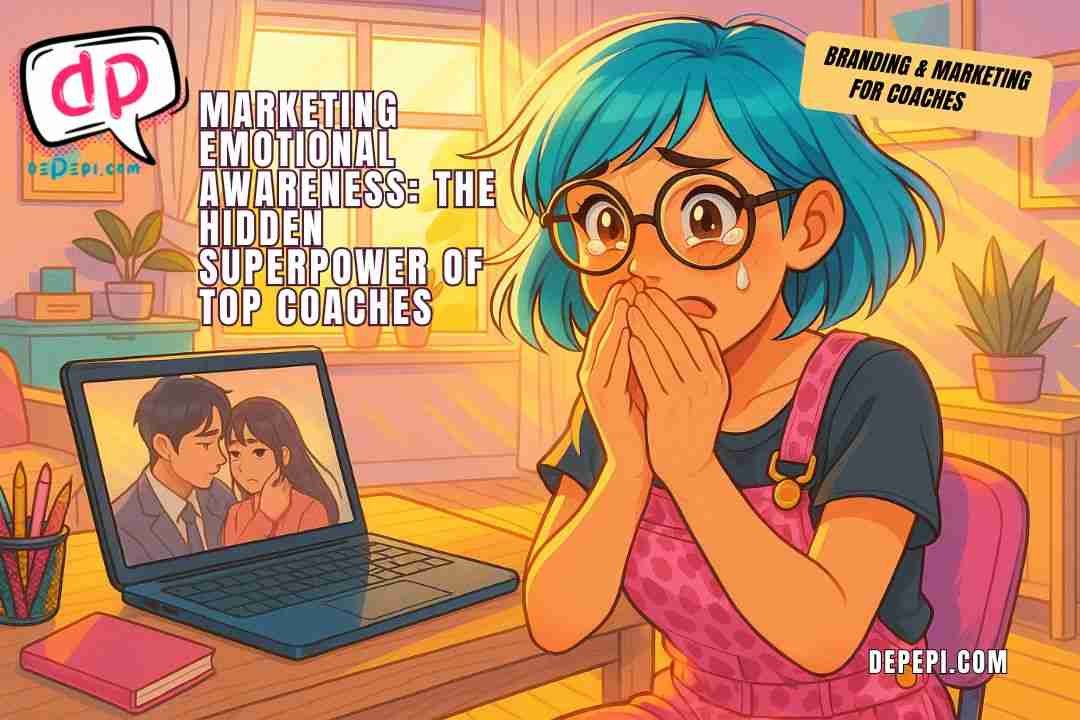Marketing Emotional Awareness: the Superpower for Coaches

Why connecting on a deeper emotional level isn’t “soft,” but the sharpest tool in your coaching kit. Marketing emotional awareness is your superpower as a coach.
There’s a reason your last coaching session didn’t follow the exact plan. Perhaps your client arrived on fire, overflowing with motivation. Or maybe they showed up quiet and raw, their voice heavier than usual, words tinged with frustration or self-doubt.
And just like that, you knew you had to pivot. Because what they needed most wasn’t another productivity hack. They needed to be seen. Not just understood intellectually, but felt emotionally.
That right there? Emotional awareness in action. It’s invisible, often unspoken, but it changes everything. And if you ask me, it’s the most underrated coaching skill in the business.
It’s also one of the biggest differentiators between average coaches and great ones—the kind that clients stay with, rave about, and refer without being asked.
But emotional awareness isn’t just a behind-the-scenes strength during client sessions. When applied with intention, it becomes one of the most powerful assets in marketing, messaging, and community building. Coaches who master emotional attunement don’t just connect better during sessions; they resonate more deeply, attract more aligned clients, and build brands that feel like home.
Let’s explore why emotional intelligence isn’t just “nice to have.” It’s the hidden superpower behind thriving coaching businesses.
Feelings Aren’t Fluff (Especially in Coaching)
There’s a lingering bias in the business world (and yes, even in the coaching world) that emotions are distractions. That they’re something to manage, regulate, or overcome so we can focus on the real work.
But that perspective misses the point entirely.
Emotions are not noise. They’re information. They are the language of desire, fear, belonging, and motivation. They tell us what someone longs for. What keeps them up at night? What they’re afraid to admit but desperately want to overcome.
If your job as a coach is to guide transformation, then your job is to understand the emotional terrain your client lives in. Otherwise, your brilliant strategies will miss the mark no matter how well they’re designed.
Emotionally aware coaches don’t just offer tools; they mirror what’s true. They pick up on the subtle cues and gently reflect back the deeper truths their clients can’t always articulate.
This is what builds trust. And trust is the foundation of any transformation worth paying for.
Emotional Awareness Makes Your Marketing Magnetic
This same skill set turns into a superpower for marketing. This is often overlooked by coaches.
Marketing is emotional.
Let me repeat that, because it’s too easy to forget in a sea of algorithms and analytics: Marketing is emotional.
No one buys coaching because of credentials or a perfect logo. They buy because something in your message makes them say:
“That’s me. That’s exactly how I feel. How did they know?”
When coaches channel their emotional awareness into their messaging (on Instagram captions, on sales pages, even in a simple LinkedIn comment), they move beyond informing to connecting.
Take a look at the difference between these two fictional examples:
Version 1: “My 8-week program helps you overcome limiting beliefs and set actionable goals.”
Version 2: “You’re exhausted from chasing potential. You keep showing up, doing the work, but deep down, you still feel behind. You’re not broken—you’re just stuck in patterns you never chose. That’s what we’ll work through together.”
See it?
One is functional. The other is felt.
And when you speak to how your audience feels, not just what they think, you activate something powerful: recognition. Clients feel seen, and that emotional resonance makes you not just another coach, but their coach.
Emotion is what separates brands that connect from those that simply inform.
Word-of-Mouth and Loyalty: The Emotional Loop
There’s a reason emotionally intelligent coaches tend to have loyal clients who stick around longer and recommend them more often.
It’s not just that they get results. It’s that they build emotionally safe spaces.
And safety breeds loyalty.
When a client knows they can show up raw, real, even off-script—and still be met with presence rather than performance—they relax. They open. They bring more of themselves to the work.
And that depth leads to transformation—not surface-level change, but the kind that’s felt in their bones.
That’s how you build not just a roster but a reputation.
“Coaches who lead with empathy create long-lasting impact. Their clients feel emotionally supported, which leads to higher retention and more organic referrals.”
In a crowded industry, this kind of emotional loyalty is gold. It’s how one client becomes three. It’s how one testimonial becomes a legacy.
How to Balance Emotional Marketing Without Losing Direction
Emotion moves people, but too much of it, handled carelessly, can overwhelm or even backfire. That’s the tension many coaches feel when they start leaning into emotionally-driven content: How much is too much? Will I come across as dramatic, manipulative, or unprofessional?
The truth is, emotional marketing isn’t about being raw for the sake of performance or pushing buttons just to get clicks. It’s about speaking directly to the unspoken and doing it with care.
So, how do you balance the human side with the strategic side?
Lead with empathy, not theatrics
Strong emotional content reflects what your clients are already feeling, not what you want them to feel. The goal is to help your audience recognize themselves in your message.
Instead of amplifying pain for shock value, reflect the experience honestly and then offer hope. Make sure your tone feels grounded, not exaggerated.
Ask yourself:
“Does this sound like I’m joining the conversation in their head or yelling over it?”
point emotion toward transformation
Emotion without direction can feel indulgent. But emotion paired with insight? That’s magnetic.
If you’re telling a story that touches on fear, grief, shame, or overwhelm, don’t leave your audience there. Show what shifted. Offer a small win, a shift in perspective, or an invitation to take action.
Emotional resonance becomes powerful when it leads to clarity and insight. You’re not just evoking a feeling—you’re guiding someone through it.
Use your voice
AI-generated content, templated scripts, and trending “emotional hooks” are tempting shortcuts. However, emotional marketing only works when it’s authentic to you.
This doesn’t mean spilling your entire life story in every post. It means filtering your message through your values, your tone, and your truth.
You don’t need to bare all to be real. You just need to sound like you.
Balance emotional content with value-driven content
If every post is deeply personal or emotionally charged, your feed can start to feel heavy or performative. But if it’s all tips and strategies, you risk sounding robotic or generic.
The sweet spot? A rhythm.
Alternate between emotional storytelling and practical insight. Let one post say, “I’ve been where you are,” and the next say, “Here’s one small step forward.”
Know your boundaries and honor theirs
Your vulnerability is powerful, but it should never feel forced. Share only what you’re comfortable sharing, and avoid using your audience as your therapist.
Likewise, be mindful of your audience’s emotional bandwidth. Overloading them with intensity can lead to disengagement. Be the coach who brings insight and relief, not one who adds to the noise.
Emotional Awareness Is Your Edge
Let’s not sugarcoat it—the coaching industry is saturated. There are countless programs, packages, personalities, and promises.
But there’s only one you.
And your ability to connect emotionally, to reflect what your clients feel but can’t yet say, is what sets you apart. It’s what makes your brand resonant, not just relevant. It’s what turns your marketing from noise into invitation. It’s what transforms sessions from structured conversations into sacred pivots.
The coaches who build the deepest trust, spark the boldest transformations, and grow the strongest communities aren’t always the flashiest. They’re the ones who know how to show up emotionally.
Need Help?
Join Branding and Marketing for Coaches and learn how to balance emotional marketing.






